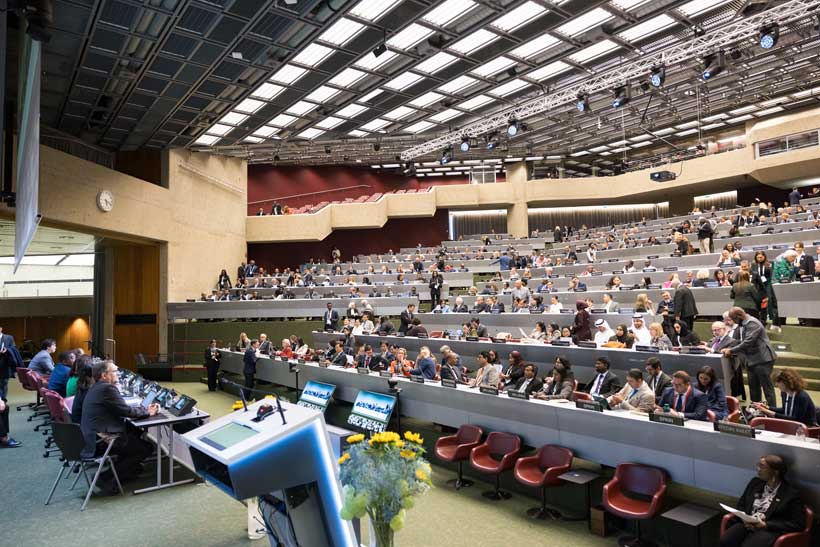This week, legislators from over 120 national parliaments are meeting in Geneva to assess the world’s collective response to humanitarian crises.
Unprecedented rates of armed violence and forced displacement, together with climate change, public health emergencies, and food insecurity, have combined with the disintegration of our systems for international solidarity.
This has created a toxic cocktail that is causing untold suffering and costing lives.
The numbers are staggering. More than 122 million people are forcibly displaced, and almost 310 million people need humanitarian assistance.
As is so often the case, the vulnerable are the most brutally affected. One in every five children in the world—approximately 400 million—are living in or fleeing conflict zones.
Children caught up in crises often face the double jeopardy of losing their homes and their education.
Before entering parliament, I was a teacher, drawn to the profession because I knew how crucial education is to children.
But education is often the first casualty during crises and too frequently neglected by an overstretched and underfunded humanitarian system.
As a result, 234 million crisis-affected children and adolescents need urgent educational support, and over 85 million are out of school.
Depriving children in these contexts of an education robs them not just of the opportunity to learn the vital skills they need for life but also to a platform to receive life-saving services like food, water, and basic health care.
Thankfully, in many crisis situations where governments lack the resources to provide education, local and international non-government organisations step in and help ensure that children get the chance to go to school.
However, the drastic cuts to development and humanitarian assistance that many countries have made this year are putting this vital work at risk.
Projections indicate that total official development assistance for education may decline by USD3.2 billion by 2026, representing a nearly 25 percent decrease from 2023 – which could potentially displace another six million children from school in the coming months.
Earlier this year, humanitarian appeals were slashed by up to 90 percent in Sudan and Chad, leaving 33 million adults and children in need of life-saving assistance, without any support.
Despite a record number of refugees, the UN refugee agency, UNHCR, has received only a quarter of the funding that it needs in 2025, forcing it to halt or suspend about $1.4 billion in programs and to slash more than one-third of its education budget.
In the refugee camps that host Rohingya refugees in Bangladesh, up to half a million boys and girls are now left without any form of schooling.
Ninety per cent of the world’s refugees live in low- and middle-income countries whose education systems already struggle to ensure every child is in school and learning.
In such cases, it is evident that host countries need support from the international community to provide the refugees they are hosting with access to education.
Education is also what crisis-affected communities want. Displaced parents and children consistently identify access to quality education as one of their highest-priority concerns.
Despite the enduring hardships they face, the determination of displaced communities to provide their children with an education is inspiring. They deserve our support.
That is why I am proud that Denmark, where I am a member of the national parliament, has affirmed its commitment to provide aid funding at or above the UN target of 0.7% of its gross national income (GNI).
With crises and conflicts multiplying around the world, it is more necessary than ever to strengthen international solidarity, and I hope that Denmark can inspire others to renew their commitment to solidarity through development cooperation and humanitarian assistance.
Tragically, a lack of funding is not the only threat to humanitarian response. The most fundamental humanitarian norms are being challenged in today’s war zones.
Current conflicts show, in appalling and devastating ways, the significant challenges facing international humanitarian law in providing effective and meaningful protection for people affected by armed conflicts.
Once again, education proves the point.
In 2022 and 2023 – the latest years for which comprehensive data is available – there were around 6,000 reported attacks on education and incidents of military use of schools and universities, harming more than 10,000 students and educators globally.
This represents a 20% increase on the previous two years, and the fear is that the number and severity of attacks on education personnel, facilities, and schools has continued to grow.
But there is a different way.
In 2015, Argentina and Norway launched the Safe Schools Declaration with the objective of avoiding military use of schools and strengthening the protection of children and education in conflict. It has since been adopted by 121 states.
Meanwhile, just last year, the International Committee of the Red Cross launched a global initiative to galvanize political commitment to international humanitarian law (IHL). Some 89 states have signed up to support the initiative.
International cooperation, like these initiatives, to address global challenges, has never been more critical.
As the institutions that represent the people, parliaments are uniquely positioned to mobilize political will, champion inclusive governance and dialogue, challenge narratives, and be the voice of the most vulnerable.
Parliaments are also key actors in translating global humanitarian norms into domestic legislation and policy, scrutinizing government action over humanitarian commitments, and allocating resources to tackle pressing humanitarian challenges.
Right now, parliamentary diplomacy – MPs from different parliaments talking and working together – has the opportunity to play a pivotal role in reinforcing multilateral values such as inclusion, solidarity, cooperation, shared responsibility, and the rules-based international order.
This week’s meeting of national parliaments in Geneva won’t solve the multiple crises we face, but it might just begin the process of reminding us that the challenges we face are global in nature and need global solutions, and forging new people-to-people relationships to do precisely that.
